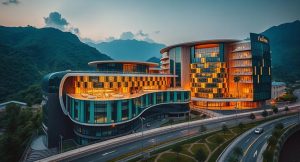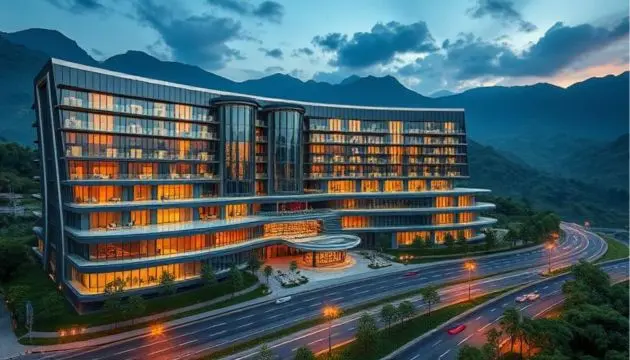ISLAMABAD: First seven-star hotel will be built on the Srinagar Highway in Islamabad, with construction possibly starting by the end of the year, according to Federal Minister for Housing and Works Mian Riaz Hussain Pirzada.
According to the details, the hotel will be developed through a public-private partnership, the minister said. A hospital will also be built nearby under the same model.
The Federal Government Employees Housing Authority (FGEHA), responsible for these projects, has approved the hotel and hospital in Sector G-13, near the Srinagar Highway Link Road to the new international airport.
Both projects will be developed through public-private partnerships and an open auction. FGEHA has also identified 11 additional sites for development through public-private partnerships. These include plots for an IT tower and an office hub in G-13, a shopping mall in the Skyline Project, an international school in G-14/2, and residential-commercial projects in Rawalpindi and Murree.
According to a newspaper report, the Federal Government Employees Housing Authority (FGEHA), in its 40th meeting chaired by Housing Minister Mian Riaz Hussain Pirzada, changed its earlier decision from the 37th meeting on December 5.
The previous decision allowed selling plots for a hotel and hospital in G-13’s Mauve Area through an open auction. The board now approves both open auction and public-private partnership as options for these plots.
–ALSO READ–
Rawalpindi plans to rehabilitate Murree Road in next fiscal year with Rs953m
FGEHA officials said they are following the Prime Minister’s instructions and working with the Public Private Partnership Authority (P3A) to explore long-term investment options, including the hotel and other commercial properties.

After discussions with P3A, the board reviewed two models for the hotel project—public-private partnership and lease-and-operate—and approved adding the public-private partnership option.
The board noted that the Murree property’s sale depends on resolving a legal dispute. The Murree property, located in a central area, was owned by a Hindu and Sikh family before partition.
After partition, the Evacuee Trust Property Board took it over and later leased it to the Brazilian embassy. In 1999, after the embassy left, the property was transferred to the Public Works Department under the Ministry of Housing. The ministry has not yet taken possession due to a legal dispute, as the caretaker claims their family has lived there for over 100 years.
In other news, city authorities plan to add a lane to the Srinagar Highway from Jinnah Square (Serena Interchange) to Murree Road to reduce traffic and improve connectivity. This decision comes as the Murree Road underpass nears completion, with its opening scheduled for May 22.
–ALSO READ–
WhatsApp to introduce status reshare option in upcoming update soon
Last week, the Capital Development Authority (CDA) issued tenders worth Rs1 billion for road widening and improvements around Jinnah Square. The underpass at the Murree Road and Srinagar Highway junction is nearly finished, with about 80% of the work completed.
Once the underpass is ready, drivers from Murree will have direct access to the Srinagar Highway. Currently, vehicles from the Murree side must go to Dhokri Chowk and turn right to reach the highway. The underpass is part of the Rs4.2 billion Jinnah Square project, funded by savings of Rs250 million from the main project and an additional Rs600 million.
In another development, the Islamabad Capital Territory (ICT) Administration has started a clean drinking water program for rural areas. Three new solar-powered water filtration plants have been installed to provide safe water and prevent waterborne diseases in areas with limited access to clean water.
One plant, opened in Sangjani by the Additional Deputy Commissioner (East), Islamabad, and the World Health Organization Country Representative for Pakistan, was built through collaboration with the DC Office, the Government of Canada, and the WHO. It will serve over 23,000 people, including Sangjani residents and Afghan refugees.
–ALSO READ–
Shahid Afridi meets PM Shehbaz, lauds Pakistan Army’s achievements
The solar-powered plant ensures a steady supply of filtered water in areas with unreliable electricity. It is sustainable and reduces operating costs. The plants operate daily, allowing community members to access clean water whenever needed.
These facilities are a significant improvement for communities that previously relied on unsafe water and faced health issues. Officials highlighted that clean water is essential for preventing diseases, especially for children and vulnerable groups.
Community members welcomed the initiative, expecting better health and relief from the challenges of unsafe water. The DC Office plans to expand the program to other underserved areas of Islamabad to improve infrastructure and quality of life in rural communities.











